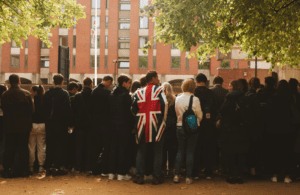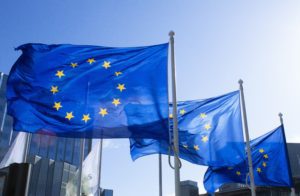It has been only two weeks since the first part of this sequel was released, but life in Russia has become even more comparable to the famous novel 1984 by George Orwell. As in the previous article, we concluded that the security system in Russia is much less organized than the one in Oceania. Police of the first country act randomly, arresting only particular citizens. In contrast, Thought Police in the second country control the whole population through every screen and many listening devices. But fear is not the only instrument in dictatorships. What also plays a vital role is the ideology imposed. Through propaganda, the State ingrains ideas in citizens’ minds, and while opposing points of view are shut by the security services, governmental concepts are absorbed with ease. So, in this second part, we will compare how propaganda contributes to the state and social systems in Russia and in 1984.
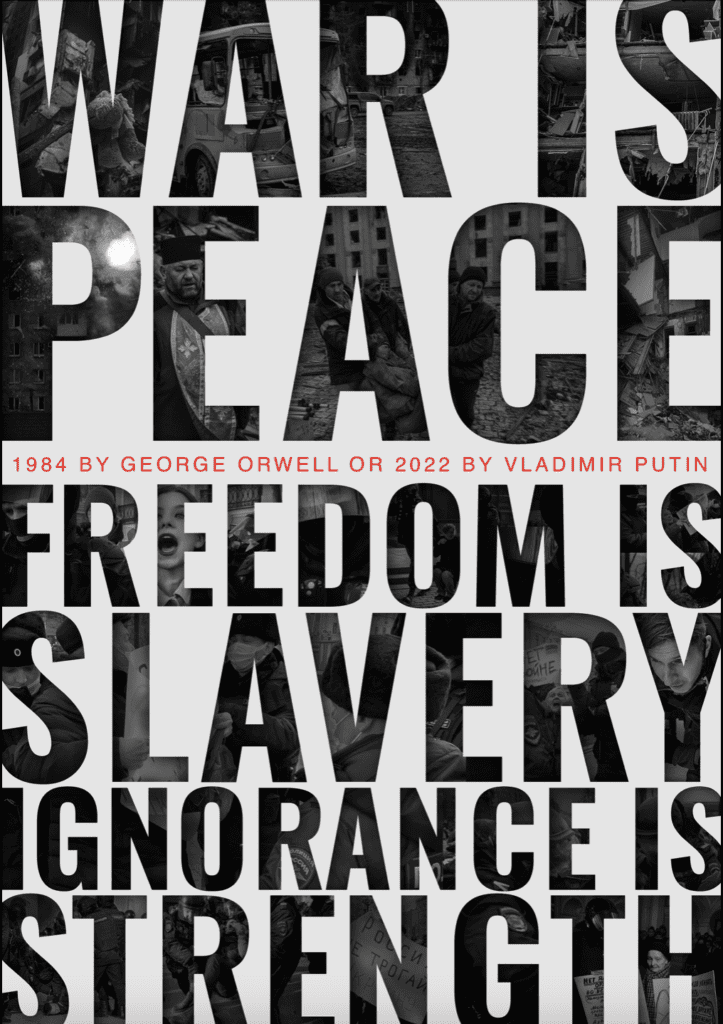
In the famous dystopian novel, society is built on a prominent slogan, “War is peace. Slavery is Freedom. Ignorance is strength.” Weirdly enough, the Party convinces citizens using antonyms. But that is how the entire system exists – on contradictions. The concept of war in 1984 is key for State politics. Oceania, the country that the story takes place in, is engaged in a constant war with either Eastasia or Eurasia, other totalitarian countries. However, the fights between them are local and small-scale rather than massive, involving a small number of trained soldiers. Starting from 1960, this war is a political and ideological instrument for countries’ internal politics. All three countries have no interest in the small pieces of land that they are fighting for, but they need the confrontation to create military conditions inside. The exaggerated war situation justifies Oceania’s low standards of life when citizens must sacrifice their welfare and liberties for “the victory.” So, propaganda frames the external military conflict as a guarantee for internal stability, or peace. Also, since citizens of Oceania, proles, work only for food and other basic needs, they are slaves. Ingsoc, the Party from 1984, makes this lifestyle seen as freedom from the necessity to think about higher needs such as safety and self-realization. Thus, being in a war is considered peacemaking, working for buying nothing more than food is represented as freedom, and lacking awareness is said to be a strength. Such a motto allows the government to bend its political line: to spend giant funds on unnecessary confrontation, as well as exploit the population that is too ignorant to protest.
The famous slogan from 1984 is easily applicable to the current situation in Russia. The government started a fratricidal war in Ukraine back in 2014. Russian troops occupied Ukraine’s Crimea and eastern regions. For 8 years, it was a frozen conflict with rare news from the region. But there was no doubt that one day the fire was going to start again. So, on February 24, 2022, Vladimir Putin reinforced the invasion of Ukraine with an ambitious plan of conquering Kyiv, the capital. However, Ukrainians turned out to be more ready and more courageous than the Kremlin expected. Now, after 7 months of fights, the war is becoming more and more local, concentrating on certain regions. Although Ukraine is successfully counterattacking, one of the ways this military conflict is going to proceed is with another 8 years of stagnation and seldom confrontation. The war has already become an inalienable part of the regime in Russia.
The propaganda calls the invasion of Ukraine “peacemaking.” The distortion of the terms “war” and “peace” is bringing us back to Oceania, the country from 1984. Also, the Russian government substitutes the definition of freedom. As Western regions, especially European countries, are known for their democratic values, authoritarian regimes and their propaganda create an image of how democracies are struggling and going through a crisis, violating human rights. For instance, on state TV channels, it is usual to see news about constant protests around Europe, especially with extreme videos of police beating demonstrators. Of course, propaganda does not show peaceful disputes about social issues, which make up the majority of all European complaints. Consequently, the Kremlin shows that classic freedom has plenty of downsides. In contrast, propaganda never streams news or stories about demonstrations in Russia, and according to the ideology, that is real freedom: freedom from the commotion, and constant stability. Additionally, Russian authorities force shutting down Russian independent media, which narrows down citizens’ ability to expand their knowledge. By imposing a one-sided point of view, the State facilitates people’s ignorance as well as makes them believe that this information is empowering and the only one that is right. Hence, the Kremlin has fully forced upon the ideology of Oceania from 1984.
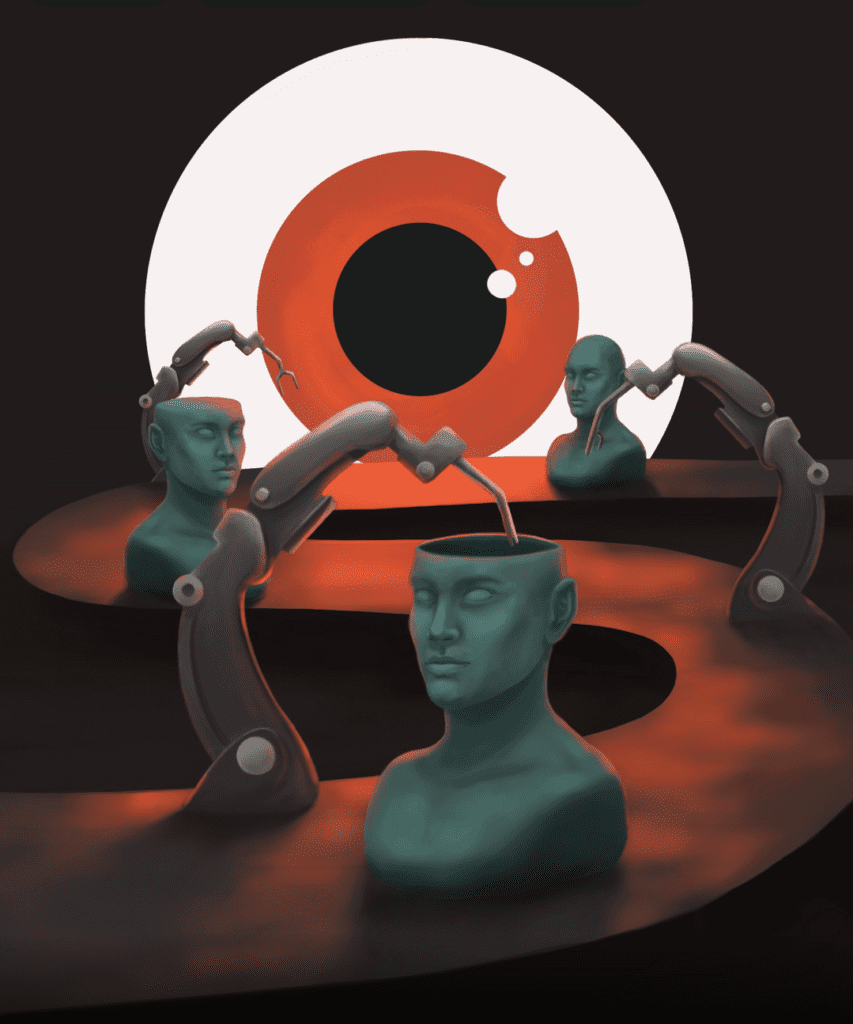
Another milestone of Orwell’s state and social system is the rewriting and inventing of history. On one of the ordinary working days, Winston, the protagonist of 1984 and Party worker in the Ministry of Truth, has to rewrite Big Brother’s speech, as it was “extremely unsatisfactory” (Orwell, 1949). Instead of the typical denouncement of thought-criminals and traitors, Winston decides to use his imagination. He comes up with a non-existent character, Comrade Ogilvy. This character is supposed to be an example of an ideal citizen, so that’s why Ogilvy has died in battle, “in heroic circumstances” (Orwell, 1949). The Comrade has always led a “right” lifestyle, prioritizing the Party over his personal life, aiming for nothing but “the defeat of the Eurasian army” (Orwell, 1949). That is the way the Party rules the society of Oceania – by fantasy and lies.
In the same manner as Ingsoc, Russian authorities manipulate citizens. The Kremlin supplies Russians with fake information on a regular basis. For instance, the State propaganda staff reinforced the greatness of the Prince of Novgorod, Alexander Nevsky, who served in the far 13th century. The prince ruled a region of Russia, or Rus called back then. Nevsky’s figure has risen dramatically in the last 10 years after it was highly respected in Stalin’s times. President of Russia, Vladimir Putin, even unveiled the memorial of the prince. In his speech back then, Putin praised Nevsky, citing Russian scientist Lomonosov, “…the one who tamed barbarism in the East and brought down envy in the West.” The president went on, telling about Nevsky’s bravery in a great battle with Swedes and a fight on Lake Chudskoye. The story sounds fascinating, doesn’t it? But the truth is that Alexander Nevsky was a collaborationist, who cooperated with Mongols and made Novgorod pay tributes to khans, Mongolian rulers. Also, the fights that the prince’s army won were not that wide-scale and massive. Therefore, the whole cult around Alexander Nevsky’s figure is invented and has little to do with true history. As it later was found out, the character of the Novgorod prince was strengthened so that State TV propaganda could compare Vladimir Putin with Alexander Nevsky in terms of today’s war in Ukraine and the battle on the Neva river in the 13th century. So, while in 1984 the Party rewrites history for citizens, the Kremlin does it for the ruler, but in both cases, the State manipulates the society.
Governmental lies do not cease at this point. Besides the characters, Ingsoc also messes with statistics. In the novel, citizens of Oceania regularly hear about the increased numbers of food, clothes, houses, fuel, and many-many more compared with the previous year. For example, at one point, Winston sees an announcement about a reduction of chocolate ration from 30 to 20 grams a week. But, a day later, it is claimed that the weekly portion of chocolate was raised to 20 grams. One day, the Ministry of Plenty claims that the amount is increased. The next day, it claims the amount is reduced. However, the number always remains the same. Thus, the Party lies about welfare while citizens have to swallow it.
Similarly, the Russian government glosses over numbers about prosperity in the country. For instance, during the peak of COVID-19 in 2020, statistics from Russia were surprisingly good. The fatality rate was 4 times less than in Germany and 14 times less than in the UK. Considering the difference in the population number and close and touristic ties with China and the EU back then, such low figures in Russia could not be true. Furthermore, not surprisingly, the Kremlin lies about the death toll resulting from the invasion of Ukraine. Recently, the Ministry of Defense informed about 5,937 killed Russian soldiers. Taking into account the length of the war (7 months) and the unreadiness of the Russian army, the number is ridiculously low. According to Western sources, the real death toll counts up to 20,000 corpses. Although we cannot be fully sure of the last number, it is obvious that the Russian army has lost more soldiers than in any conflict in recent decades. So, to maintain neutrality and support, the Kremlin feeds Russians devastating statistical lies.
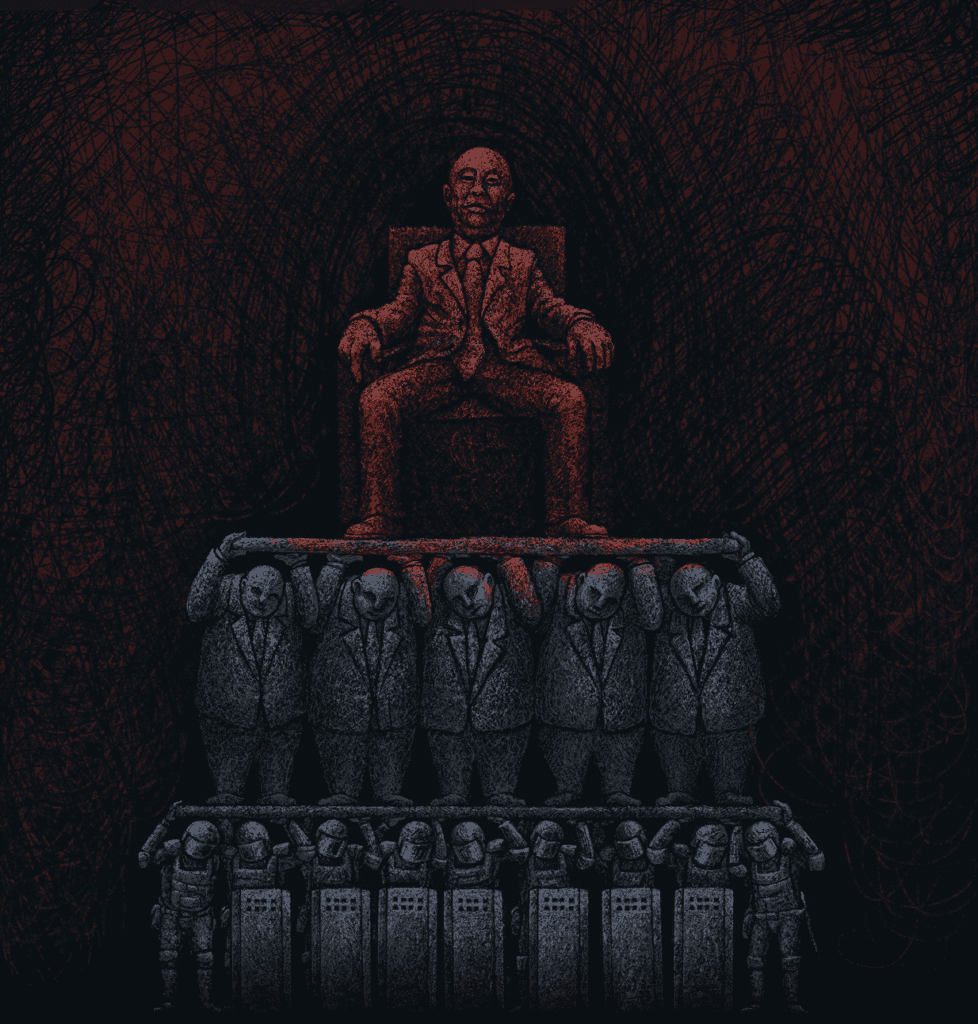
Moreover, it is one thing to change numbers, but to change words becomes a whole new issue. One can change digits in a number but cannot change letters in words with the same ease. So, it is more convenient to make up a new language with new words. That is why Ingsoc invented Newspeak, a language that citizens of Oceanus must speak. In contrast to Oldspeak (standard English), Newspeak consists of simplified grammar and limited vocabulary that restrict an individual’s ability to think and talk about personality, freedom, and self-expression. The language is designed to fully meet the Party’s ideological requirements. For example, “free” in Newspeak can only mean the absence or lack of something, while intellectual and political freedom can only be defined as “crimethink.” Thus, the authorities from 1984 created a new language to persuade Oceanians of inverted meanings.
Likewise, the Kremlin invents new terms for events. For instance, Russian authorities use “gas kick” for talking about the explosion of gas in buildings. At first, it might seem indifferent. But if you see news saying, “Gas kicked in a dwelling house near Moscow,” you will not react as anxiously as if you read “Gas explodes in a dwelling house near Moscow.” So, the Kremlin uses “gas kick” to set the agenda in a less panicky way. There are also more recent examples of Russian Newspeak. For all 7 months of the invasion of Ukraine, the government has been calling it a “special military operation.” The authorities went even further and reinforced administrative and criminal articles for those who say “war” instead of “special operation.” Nowadays, a citizen who uses normal Russian, not Kremlin’s Newspeak, can be either fined or sentenced to prison for up to 15 years. The latest case of using the new vocabulary is the announcement of a “partial mobilization.” While according to the decree only men with military experience can be mobilized, there have already been numerous cases of random selection among Russian males. Obviously, the mobilization is not partial, but the authorities prefer to use the new term not to ring Russians’ panicking bells. Therefore, the Kremlin uses its Newspeak and inverts the meanings of the Russian language to deceive citizens and mislead their thinking process.
This whole system described above leads to a society divided into two parts. In one half, there are those who fully absorb propaganda thrown at them every day. Their opinions are aligned with the ideology and they believe in the rightness of the dictator. These supporters enjoy the 2-minute hate ritual in 1984, watching how the State unites people against a common enemy. Pro-Party citizens loathe Eurasia and Eastasia, other empires that Oceania is at war with. Hating these countries is a vital part of Ingsoc’s ideology. So, despise-based propaganda from telescreens is what unites supporters of the regime in Oceania.
The system of government support in Russia is built analogously. Pro-Kremlin citizens usually watch TV where propaganda throws a load of information soaked with hate for the Western world. State TV channels openly claim that NATO, the USA, and the EU are Russia’s sworn enemies, whom they (the Kremlin) can destroy in a minute using a nuclear weapon. On Talk shows like “Evening with Vladimir Soloviev,” so-called experts just copy 2-minute hate from 1984, as all they do is threaten and slander the rest of the world. This whole hate for the democratic part of the world is chipped in the minds of the audience. The most bizarre point is that most anti-West viewers have never gone any further than Turkey for a 10-day vacation. In fact, 70% of Russians do not even have an international passport for travel. So, it is easy for the State to create a negative image of the USA and Europe in the minds of citizens that do not have personal experience with the places. Therefore, another landmark of the Kremlin’s regime is the common hate for the West, created by propaganda.
Contrary to supporters, there are always oppositions. However, in totalitarianism, it is a lot harder than in democracy. People like Winston are already a big achievement in terms of being against the government. Although he works in the Ministry of Truth, Winston is completely disappointed in the Ingsoc. The character believes neither in the notorious false statement “2+2=5” nor in Party’s almighty. He knows that one day he will be taken down for his views that he has never even expressed. Contrasting to his young and naïve girlfriend Julia, Winston is sure that “from the moment of declaring a war on the Party it was better to think of yourself as a corpse” (Orwell, 1949). In the State’s total control, he can’t find like-minded people since they are either unpersoned or forced to shut up. But what matters is that he is one of, probably, not so many dissidents in society, that he is standing at the roots of the anti-Ingsoc movement.
Likewise, Russians opposed to the status quo are struggling with Putin’s dictatorship. The majority were forced to flee the country under threats of criminal cases and prison bars. The numbers of Russian immigrants peaked in March after the war began, and in the last days, when mobilization started. Overall, approximately 200,000 people left Russia in a week. Those who cannot afford to drop their typical lifestyle have to stay inside the country. Like my parents, such citizens are disenchanted with the regime, left with no choice except to live every day without knowing what to expect tomorrow and how to plan the future. Finally, the smallest number of Russians are famous activists and politicians who are brave enough to oppose the Kremlin while staying in their Motherland. Daredevils like Alexey Navalny, Ilya Yashin, and Alexey Gorinov are spending their days in prison, because their ideas are more fundamental than safety for them. The oppositional part of Russians, just like Winston, is living through its hardest times, when fighting the regime has become impossible. People have to choose between leaving Russia for their security or staying inside, risking their well-being and welfare.
Concluding, it is obvious that the current situation in Russia is pasted from George Orwell’s novel 1984. The Kremlin and the Ingsoc both manipulate their citizens by implementing war-oriented and hate-based propaganda, rewriting history, substituting statistics numbers, and even the inversion of words. The whole totalitarian system leads to the division of society: one part supports the regime with its propaganda, and the other, the opposition one, is trying to survive under the majority of the first and pressure of the State. With every news and every announcement, 1984 is becoming Russia’s 2022. Unfortunately, we do not know what happened to the citizens of Oceania, but supposedly, dictatorships like Ignsoc, are hardly changeable. Therefore, there is little space for hope in the case of Russia and its totalitarian regime…
Featured image by: Serena Dezio through Behance


